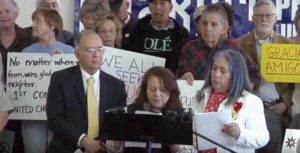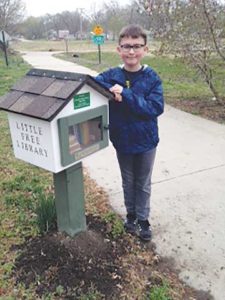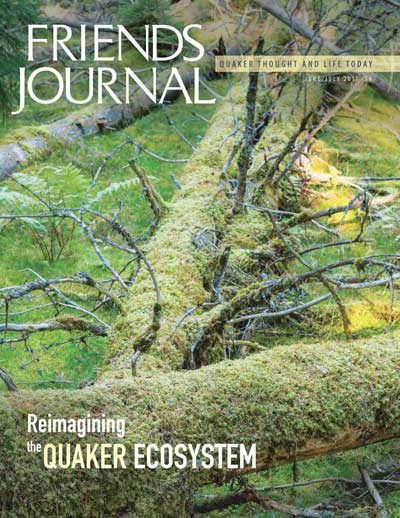Albuquerque Friends provide sanctuary

Albuquerque (N.M.) Meeting is providing sanctuary for a local woman facing the possibility of deportation or detention. Emma Membreno-Sorto came to Albuquerque Friends on March 6, and has been staying at the meetinghouse since. Membreno-Sorto, a Honduran immigrant with incomplete immigration paperwork, requested sanctuary in light of the dramatic increase in detentions and deportations by U.S. Immigration and Customs Enforcement (ICE) as a result of executive orders issued by the Trump administration that makes immigration law violations a deportable offense.
Albuquerque Meeting has been involved in sanctuary work around immigration since the 1980s. In 1984, the meeting approved a minute offering “the sanctuary of religious fellowship to refugees fleeing violence in Central America.” At that time, the meeting was involved with housing and supporting refugees as they either settled in Albuquerque or moved on to other destinations.
Thirty years later, Albuquerque Friends revisited the idea of sanctuary. Two more minutes were approved relating to sanctuary in August and November of 2014. These minutes laid the groundwork for the meeting’s involvement with the new sanctuary movement and its continuing relationship with the New Mexico Faith Coalition for Immigrant Justice, leading to its provision of sanctuary.
On March 3, members of the meeting met with the New Mexico Faith Coalition for Immigrant Justice and other local churches committed to sanctuary work. At this meeting, representatives learned of a request for sanctuary by a local woman who feared deportation or detention by ICE.
On March 5, Albuquerque Friends postponed most of the scheduled business at their business meeting to discuss the possibility of offering sanctuary at the meetinghouse. The business meeting lasted over four hours, and unity was found to offer sanctuary. The previously accepted minutes, which outlined reasons for providing sanctuary, proved very important in the discussion of this opportunity. A member of the newly formed Sanctuary Task Force said the decision to provide sanctuary housing “took four and half hours, and 34 years.” Membreno-Sorto moved into the meetinghouse on the following day.
Although the physical housing for sanctuary is being provided by Albuquerque Meeting, the meeting is not alone in supporting Membreno-Sorto. Approximately 100 volunteers from the local community, including many other local places of worship, have been trained to provide accompaniment. A volunteer is with Membreno-Sorto 24 hours a day, seven days a week. These volunteers have been trained in supporting Membreno-Sorto through sanctuary. Trainings included the legal rights of those offering sanctuary, as well as role playing on how to respond if ICE came to the door.
Additional support for the meeting has been provided by American Friends Service Committee (AFSC), through both the Albuquerque and Denver, Colo., offices. Further support was provided by Mountain View Meeting in Denver, which has been providing sanctuary since December 2016. Information and support provided by AFSC and Mountain View Friends assisted Albuquerque Meeting with the transition from discussing to providing sanctuary at their meetinghouse.
The Albuquerque Meeting press conference on providing sanctuary to Membreno-Sorto can be viewed on YouTube; go to fdsj.nl/albuquerque-sanctuary.
Friends engage in immigrant rights work
Friends across the world have expressed concerns with growing anti-immigrant attitudes and policies. In February, the Quaker United Nations Office (QUNO) published a briefing for Friends: “Protecting refugees and migrants under the New York Declaration: challenges and opportunities at the UN level.” The briefing states that QUNO’s work on behalf of refugees and migrants “stems from [their] principle to uphold the dignity and worth of every individual, regardless of their nationality or circumstance they find themselves in.”
The QUNO briefing reflects other statements that have been put out by Friends. On April 21, Mount Toby monthly meeting of Leverett, Mass. published a statement urging Massachusetts lawmakers to pass the Safe Communities Act. The act would prevent the commonwealth from creating a registry of Muslim residents, and from assisting the federal government in doing so. The article echoes the QUNO briefing in stating that Quakers “are called to love our neighbors as ourselves and cannot support the recent federal executive policies restricting immigration and accelerating deportation which put our friends, neighbors, and fellow human beings in unconscionable jeopardy.”
In addition to statements, local meetings and churches are also taking concrete actions to support immigrants and their families. Quaker meetings in Denver, Colo. and Albuquerque, N.M. have taken in people seeking sanctuary, or protection from U.S. Immigration and Customs Enforcement officers. Provision of sanctuary has been a movement embraced by U.S. faith organizations since the 1980’s. At that time, churches and faith communities would offer shelter and hospitality to people fleeing violence in Central America.
Today, sanctuary has come to mean providing shelter on a church or meeting property. Although legally churches can be raided by immigration officers, it has long been practice that people taking sanctuary on the grounds of a faith community are not taken into custody. Mountain View Friends Meeting took in a family seeking sanctuary in November. The meeting had been involved with the Metro Denver Sanctuary Coalition for two years before taking in the family. In a press release, David Poundstone of Mountain View Friends said of offering sanctuary, “we cannot stand idly by and let our government threaten the integrity of families. We feel called upon to engage in civil initiative to invoke the tradition of sanctuary to protect those under threat of harm.”
Bridge Film Festival announces winners
The Bridge Film Festival features films by youth who attend a Quaker school, camp, or meeting. Film submissions for the eighteenth annual festival were due by March 15, and the judges choice awards were announced on April 18. Entries were submitted under four competitive categories: narrative, documentary, public service announcement, or new media.
Each of the entries was evaluated on its representation of the festival’s mission, which is to “provide[sic] a forum for dialog, learning, and exchange of ideas of commonality and diversity.”
A total of 19 films were submitted to the festival, from participants in three different countries. Judges evaluated the films across multiple criteria, including creativity, technical quality, and relevance to Friends. A winning film was selected from each category of submissions, and a Spirit of the Festival award was also given across submissions from all four categories.
The winner of the documentary award, Being Other, was submitted by students at George School. The film features multiracial students talking about their experiences being part of multiple cultures and navigating feelings of belonging and otherness.
In the public service announcement category, the film Be a Friend, Not a Bully was chosen. This submission came from Friends School Mullica Hill. Be a Friend, Not a Bully is a short dialogue-free piece showcasing the power of students standing up to bullies and reaching out to each other.
An LD Student’s Educational Journey was recognized in the new media category. This film was submitted by Delaware Valley Friends School. It features a student speaking about her own experiences with dyslexia and ADHD.
The award in the narrative category went to the film Simply Sophie, submitted by Tandem Friends School. This short film looks at the pressure of being a young student, and the joy that can be found outside of the classroom. Students at Tandem Friends School also submitted the film Mannequin Challenge – Peace and Stewardship. This film addresses the concepts of peace and stewardship with frozen tableaus. Mannequin Challenge – Peace and Stewardship was chosen for the Spirit of the Festival award.
The Bridge Film Festival website features a short film that announces the winners in each category, as well as showcasing festival entries and judges’ evaluations. The site also features playlists of films based on the SPICES testimonies (Simplicity, Peace, Integrity, Community, Equality, and Stewardship).
The videos can be viewed at bridgefilmfestival.blogspot.com.
Earlham College receives $7.5 million gift
Earlham College, a Quaker university in Indiana, recently received a $7.5 million donation. The gift will go toward the school’s Earlham Plan for Integrative Collaboration (EPIC) program. The new EPIC Advantage program guarantees all junior and senior level students an opportunity to participate in a paid internship or research opportunity, beginning in summer 2017.
The money is a gift from Alan and Peg Kral Scantland of Columbus, Ohio. Both graduated from Earlham in 1974. Their gift is the largest single alumni donation to Earlham in the institution’s history. In an article published on Earlham’s website, Alan Scantland is quoted as saying that he and Peg both “have benefitted tremendously from our Earlham education,” and “are happy to support Earlham in its efforts to provide similar experiences to future students.”
EPIC began at Earlham in 2016, providing academic and career advisors to each student. EPIC aims to bring together liberal arts education with practical experiences, and to help students put their learning into practice. The EPIC program provides extensive advising and guidance. This guidance helps students find the right opportunities for their own goals. Through EPIC, students may participate in self-guided research, internships, or collaborative projects.
Earlham’s three interdisciplinary academic centers are housed in the campus’s CoLab. The three centers—global health, entrepreneurship and innovation, and social justice—promote EPIC internships and research that are focused on each center’s particular field.
The EPIC gift and the new Advantage program will offer internship and research opportunities to students who may not have had the opportunity before. With continually rising costs of tuition at colleges and universities, many students are unable to devote time to an unpaid internship, needing to spend the time at a paying job instead. The EPIC Advantage program scholarships, which can be applied toward travel and living expenses, will help students who need an active income to take full advantage of extended learning opportunities.
Oread Friends install a Little Free Library

Oread Meeting in Lawrence, Kans., recently installed a Little Free Library outside their meetinghouse. The library is dedicated to the memory of the late Deborah (Misty) Gerner, a passionate reader, beloved member of Oread Meeting, and contributor to When the Rains Return: Toward Justice and Reconciliation in Palestine and Israel, published by American Friends Service Committee in 2004. Misty’s legacy included a donation to the meeting. In October 2016, the meeting decided to use the legacy donation to help pay the costs for constructing the Little Free Library structure.
Set beside a leafy trail next to the meetinghouse, the weatherproof wooden box is about the size of a dollhouse. Decorated by the children in First-day school, the Little Free Library is meant to entice strollers to take a book, and later return the book or leave another one.
The Little Free Library structure was crafted by Lawrence local Jo Anderson out of recycled materials, and roofed by a local roofer. Once the library was built, it was painted by the participants of Oread Friends’ First-day school. The children painted the structure in colors to match the outside of the meetinghouse. Adult members of the meeting completed the decoration by stenciling “Little Free Library” on the side of the house and attaching plaques. A plaque commemorating Misty Gerner states that she was “Friend, Scholar, Peacemaker, and Lover of Reading.” A second plaque was provided by the Little Free Library Association. The library is also registered with the Little Free Library Association, and is listed on the association’s website. The library was erected in March, and stands at a height easily accessible to children.
After the library was installed, each child in the First-day school class brought in at least one favorite book to share. They each took a turn telling the others why they chose the book they brought, and the books were all placed in the library. The library was also supplemented with additional books for adults from the meeting’s library. A guest book and pen were also placed in the library, for people to sign when they take or leave a book.
On April 30, Oread Meeting held a grand opening and reception ceremony for their new Little Free Library. The meeting invited the neighborhood through the local neighborhood association to join in celebrating the new community resource.



Comments on Friendsjournal.org may be used in the Forum of the print magazine and may be edited for length and clarity.